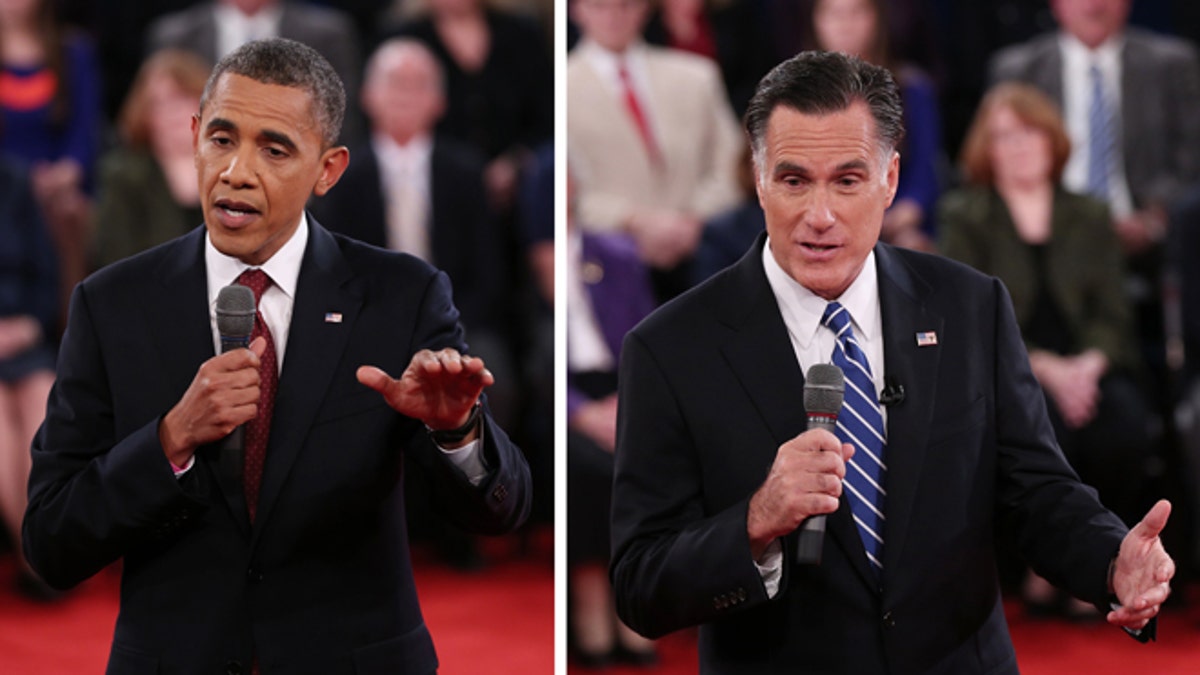
Oct. 16, 2012: President Barack Obama, left, and Republican presidential nominee Mitt Romney address the audience during the second presidential debate at Hofstra University. (AP/Reuters Pool)
It was no coincidence that in the foreign policy debate Mitt Romney and Barack Obama each repeatedly pledged to protect Israel’s security. Both men recognize that the Jewish vote could determine the outcome of this election. But how is it possible that a constituency comprising 2 percent of the population could make the difference?
First, Jews are concentrated in the states that count most in the electoral college. The top 10 states with the largest Jewish populations account for 244 of the 270 electoral votes needed to win the presidency.
Second, Jews vote in higher proportions than any other voter group. In 2008, 96.2 percent of Jews voted.
Third, Jews are major contributors to political campaigns. They typically are top fundraisers and active party workers. Obama and Romney each have a coterie of close advisers and donors who are Jews. Though dwarfed by realtors, lawyers, unions and other major contributors to political action committees, pro-Israel contributors rank 47th out of 80 “industries” monitored by the Center for Responsive Politics. So far, in 2012, pro-Israel individual, PAC, and soft money contributions total more than $10 million, with nearly two-thirds going to Democrats.
The contributions reflect the fact that Jews have Democratic DNA. Since 1916, the average vote for Democrats has been 71 percent compared to 24 percent for Republicans. George H.W. Bush was the last Republican to get more than 30 percent.
Polls indicate Jews’ top priority, like most Americans, is the economy, but these underestimate the importance Israel plays in the voting decisions of many Jews. The percentage who vote solely on the basis of a candidate’s policy on Israel may be relatively small, but most Jews do take it into consideration and several presidents have learned this to their detriment.
Take, for example, George H.W. Bush, who received 35 percent of the Jewish vote because he was expected to carry on the pro-Israel policies of Ronald Reagan. When, instead, his policies were viewed as harming Israel, his proportion of the Jewish vote sank to 11 percent.
Similarly, Jimmy Carter’s share of the Jewish vote fell from 71 percent in 1976 to 45 percent in 1980, despite his role in the Egypt-Israel peace treaty, because Jews did not trust his views on Israel.
On the Republican side, Jews feared George W. Bush would be as critical of Israel as his father and gave him only 19 percent of their votes in 2000. Four years later, he was considered very pro-Israel and his share of the vote jumped to 24 percent.
In 2008, starting with a solid Jewish base, and aided by the declining economy and the choice of Sarah Palin as John McCain’s vice presidential candidate, Barack Obama easily won 78 percent of the Jewish vote, just short of the 80 percent Bill Clinton received in 1992.
Jews now can judge Obama’s record. After his first two years, Obama’s policies were widely viewed as bad for Israel. His settlement freeze demand was unpopular and backfired, he failed to bring the Palestinians to the negotiating table and he treated Israel’s prime minister with thinly disguised disdain.
According to Gallup, Obama’s popularity among Jews fell precipitously from 83 percent in January 2009 to 54 percent in September 2011. An American Jewish Committee (AJC) poll the same month found that 53 percent of Jews disapproved of Obama’s handling of US-Israel relations.
In January 2011, Obama’s policy toward Israel changed almost 180 degrees. He began to praise Israel at every opportunity and pledge his support for its security. He stopped talking about settlements, going so far as to veto a UN Security Resolution to declare them illegal, provided Israel with more weapons and enhanced military cooperation. By April 2012, the AJC poll reported Jewish approval of his handling of Israel relations had jumped from 40 to 58 percent and 61 percent favored Obama over Romney. Gallup showed an even more dramatic increase in support to 68 percent.
The election may be decided on whether the Jewish vote for Obama continues its upward trajectory or was adversely effected by the presidential debates, Romney’s promises or recent Middle East events. Romney will not win the Jewish vote, but he can chip away at Obama’s support. If he can cut Obama’s share of the Jewish vote to 65 percent, the president could lose 83,500 votes in Florida, 41,500 in Pennsylvania and 19,000 in Ohio according to Obama’s Jewish outreach professional, Ira Forman.
Obama must also be mindful of history. The last two Democrats to receive less than 70 percent of the Jewish vote – Dukakis and Mondale – were both defeated.
